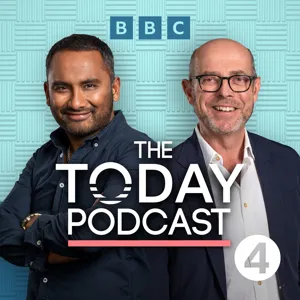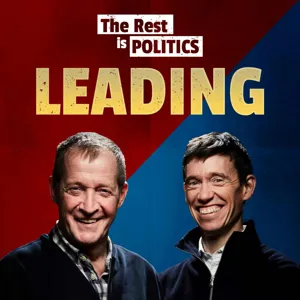Podcast Summary
Criticism of David Cameron's Appointment to Rishi Sunak's Government: David Cameron's appointment to Rishi Sunak's government faced criticism due to past involvement with Greensill, a finance company, and the potential for conflicts of interest in advocating for its financing methods in COVID-19 business loans.
The appointment of former Prime Minister David Cameron to a role advising Rishi Sunak's government has faced heavy criticism, with Keir Starmer and several Labour MPs questioning Cameron's judgment and experience. The Greensill affair, a past scandal involving Cameron's involvement with a finance company, has resurfaced as a point of contention. The affair involved Cameron advocating for Greensill's financing methods to be included in the COVID-19 business loan scheme, despite the controversial nature of the practice. Cameron's involvement raised eyebrows due to the potential for conflicts of interest, as he had previously worked for Greensill. The incident highlights the importance of transparency and ethical considerations in political appointments.
David Cameron's Past Actions and Relationships Scrutinized: Critics question David Cameron's foreign policy expertise due to past actions like EU exit and interventions in Libya, with some citing poor decision-making and lack of planning. His close ties with China could also be an issue given the current government's stance.
David Cameron's experience as prime minister and foreign secretary, particularly his involvement in the EU exit and relationships with countries like China, are being scrutinized in light of his potential return to politics. His tenure was marked by significant foreign affairs events, including the EU departure and interventions in Libya, which have raised questions about his foreign policy expertise. Some criticize his handling of these issues, citing poor decision-making and lack of planning. Others point to his close ties with China during his time in office, which could be a potential issue given the current government's more skeptical stance towards China. Overall, Cameron's past actions and relationships are under renewed scrutiny as he considers a political comeback.
China's Influence-Buying Tactics in Developing Countries: The Chinese government is using various tactics to buy influence and votes in developing countries, as seen in the case of a port in Colombo, Sri Lanka. The appointment of David Cameron as Foreign Secretary was a deliberate move to divert attention from other news and dominate headlines.
The Chinese government is using various tactics to buy influence and votes in developing countries. This was highlighted during a discussion about a port in Colombo, Sri Lanka, which was described as a Chinese outpost and a classic example of China's influence-buying tactics. Another topic touched upon was the unexpected appointment of David Cameron as the new Foreign Secretary, which overshadowed other news, such as the sacking of Suella Braverman and Nadine Dorries' outbursts. The appointment of Cameron was seen as a deliberate move to divert attention from other news and dominate the headlines.
Suella Braverman's Resignation and Rwanda Immigration Policy: Suella Braverman's resignation raised questions about gov't intentions and effectiveness of Rwanda immigration policy, while Rishi Sunak's handling and conflicting stances were criticized.
Suella Braverman's resignation from her role as Home Secretary and subsequent op-ed in The Telegraph happened quickly, leading to speculation that the government was trying to prevent her from using the Rwanda immigration policy decision for her own PR purposes. The Rwanda decision was seen as unlikely to succeed, and Rishi Sunak's handling of the situation was criticized. The incident highlights the potential confusion between being a cabinet member and an op-ed writer, and raises questions about the effectiveness of the department in charge of the Rwanda policy. Additionally, Rishi Sunak's political stance was seen as divided, with attempts to present a centrist image contrasting with his hardline stance on immigration.
UK's Contradictory Immigration Policy and the Use of Rwanda: The UK's immigration policy, with its focus on stopping boats, creates contradictions and confusion. Rwanda's use as a safe country despite human rights concerns highlights this. The policy's goal is arbitrary and potentially undeliverable, with real issues coming from other sources and constant leadership changes.
The UK government's immigration policy, specifically the "Stop the Boats" slogan, is a complex issue that raises contradictions and confusion. Rwanda was used as an example of a country with problems in human rights law, yet the government passed a law declaring it safe to deter immigrants. This creates a contradiction in the policy's goal. The government's attachment to the "Stop the Boats" slogan is seen as arbitrary and potentially undeliverable, especially as the number of boats crossing the English Channel has been decreasing. The real immigration issues come from other sources, such as students and visa extensions. The constant turnover of Home Secretaries, including Priti Patel, who have been sacked for various reasons, adds to the instability and confusion surrounding the policy.
The Crown's portrayal of Princess Diana sparks controversy: The Crown's fictionalized take on Princess Diana's life has stirred up controversy, with some accusing the series of disrespecting her memory, while others are captivated by its authenticity and availability on Netflix.
The new series of The Crown, covering the period leading up to Princess Diana's death in 1997, has generated significant excitement and controversy due to its proximity to living memory and frequent retellings of the story. The papers have reacted with fury and intrigue, cashing in on the public's fascination with the royals and the Netflix production. The Crown's popularity can be attributed to its posh appeal and its availability on Netflix. However, the lack of a disclaimer stating that the series is fiction has led to accusations of disrespecting Diana's memory. Despite the controversy, the series has already inspired numerous spin-offs and discussions on its authenticity. For those who experienced the events firsthand, like the speaker, the coverage brings back vivid memories. Overall, The Crown's portrayal of the royal family continues to capture the public's imagination and spark intense debates.
The Complex Relationships Between Royals, Media, and Public: The Crown highlights the collusion between royals, media, and public during Princess Diana's death, with everyone using the media to their advantage. From Mohammed Al Fayed directing paparazzi to Diana's deals with photographers, to Charles advising his sons on photoshoots, the series explores the intricate web of influence.
Learning from the recent discussion about the new series of "The Crown" and the coverage surrounding Princess Diana is the collusion between the media and the major players involved. From Mohammed Al Fayed directing paparazzi to Diana on Dodi's yacht to Diana herself striking deals with photographers, and Charles advising his sons to participate in a photoshoot, everyone seemed to be using the media to their advantage. Additionally, the public's emotional reaction to Diana's death was a topic of debate, with some arguing it was hysterical and others acknowledging the collective grief. One journalist, in particular, faced backlash for questioning the public's emotional response at the time. The series also touches upon the narrative that the nation experienced an emotional breakdown following Diana's death, which is now widely accepted. Another intriguing detail is the focus on the ring Dodi allegedly gave Diana, which was described as a hideous, large gold piece with the inscription "demois weed." Overall, "The Crown" sheds light on the complex relationships between the royals, the media, and the public, and how these entities influenced each other during a pivotal moment in British history.
The complex relationship between the British monarchy and the media: The relationship between the British monarchy and the media is intricate and ever-evolving, with both sides using each other to their advantage. The line between truth and sensationalism is often blurred.
The relationship between the British monarchy and the media has long been a complex and intricate one, with both sides using each other to their advantage. During the time of Princess Diana, there were key media figures who were close to the royals and to Diana herself, leading to a constant flow of leaks and scoops. On the other hand, there were figures like Piers Morgan who openly aligned themselves with wealthy individuals like Mohamed Al Fayed, providing a platform for their stories. This dynamic is reminiscent of the current coverage of Harry and Meghan's relationship with the royal family. The line between truth and sensationalism is often blurred, and everyone involved has a role to play in shaping the narrative. The Crown, a popular Netflix series, highlights this intricate relationship, with its portrayal of the media's coverage of the royals and their scandals. While some may find the series' interpretation of events to be a sensationalized version of history, others may see it as a reflection of the complex and ever-evolving relationship between the monarchy and the media.
Historical Dramas vs. Documentaries: Authenticity and Intent: Historical dramas should have a clear perspective and intent, ensuring authenticity and transparency, unlike documentaries.
Historical dramas should have a clear perspective and intent in manipulating events, unlike documentaries. The speaker expresses confusion about the purpose of "The Crown" and shares a personal experience where a writer attempted to cast him in a drama based on real events, despite inaccuracies. The speaker also pokes fun at the inaccuracies in "The Crown" regarding Steve Coogan's involvement. The speaker emphasizes the importance of authenticity and transparency in historical storytelling. Additionally, the speaker engages in a quiz game with the audience, providing clues to guess political figures based on their descriptions.
Discovering the unexpected human side of politicians: Politicians, like Alastair Jack, have surprising traits and passions beyond their public image, such as a love for the arts and creativity.
Alastair Jack, the Scottish secretary and a cabinet member, is described as a genuinely nice person by Liz Truss. This is notable because Jack is known for his love for the arts and his creativity, which sets him apart from the typical image of a politician. Despite his background in lobbying, Jack is viewed as trustworthy, loyal, and kind. The discussion also touches upon Boris Johnson's artistic side and his painting of Nadine Dorries, as well as the various cabinet members mentioned throughout the conversation. The game of identifying genuine versus made-up sentences from the book adds an entertaining twist to the conversation. Ultimately, the conversation highlights the unexpected qualities and human side of political figures, showcasing that they are not just one-dimensional figures but complex individuals.
Discussing Characters' Food Preferences: Participants debated if certain food choices fit characters' personalities, revealing their own food experiences and socio-economic backgrounds.
Exploration of the characters' preferences and perceptions towards food and drinks, as well as their socio-economic backgrounds. The participants expressed their opinions on the presence of espresso martinis and tartiflette in a book, questioning whether these choices fit the characters' personalities. The discussion also revealed some light-hearted banter and humor, as they debated the poshness of certain dishes and their own food experiences. Ultimately, the conversation highlighted the unique aspects of each character and their individual tastes.






